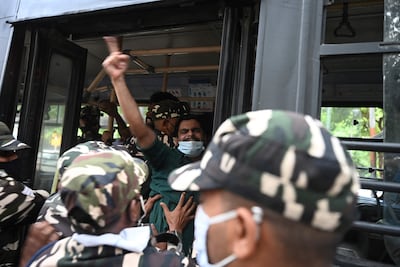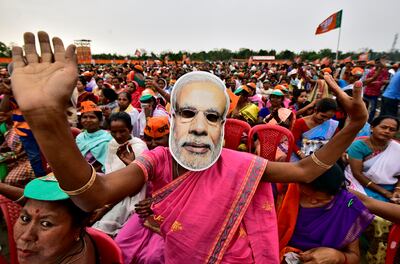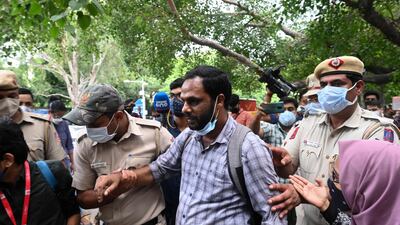Public outrage has gripped India over a viral video that shows a government photographer stamping on the dead body of a protester, moments after he was shot dead by police in northeast India during a land eviction demonstration.
Two protesters were shot dead and nine policemen were injured on Thursday in clashes between authorities and residents of a riverside hamlet in Sipajhar in Assam state.
Ethnic tensions in Assam have been simmering for decades over the alleged influx of undocumented immigrants from Bangladesh.
The nearly two-minute viral video shows a large posse of policemen firing semi-automatic rifles at a stick-wielding protester as he chases the police, before falling to the ground after a bullet injury to the chest.
A group of policemen then use batons to beat the motionless body of the man, later identified as Saddam Hussain, before another man – identified as government-employed photographer Bijoy Shankar Bonia – stamps on him and punches him repeatedly.
Police said Mr Bonia, who works for the state government as a photographer, was embedded with officials responsible for clearing government land allegedly occupied by thousands of Bengali-speaking Muslim families.
State authorities launched an investigation led by a retired judge and arrested Mr Bonia on unknown charges after a national public outcry.
Anger at Modi
Opposition politicians, human rights activists and social media users on Twitter and Facebook condemned Prime Minister Narendra Modi’s ruling Bharatiya Janata Party and the regional government over the brutal assault on Bengali-speaking residents.
"Assam is on state-sponsored fire," Congress leader Rahul Gandhi said in a tweet. “I stand in solidarity with our brothers and sisters in the state. No children of India deserve this.”
Many users questioned the disproportionate and brutal police force used against the protesters, who were resisting the demolition of their homes.
“What protocol orders firing to the chest of a lone man coming running with a stick @assampolice?” Kavita Krishnan, a politician and women's rights activist, wrote on Twitter.
Police said they were attacked by armed mobs and used force for self-defence while clearing the settlement of illegal squatters.

Dozens of demonstrators gathered outside the Assam government office in New Delhi on Friday to protest against the violence during the eviction drive.
Assam state has been trying to clear nearly 25,500 hectares of riverside land allegedly occupied by illegal settlers, saying the land is being handed over to indigenous communities in line with an ambitious government farming strategy.
The controversial plan was approved in June but violent clashes erupted three days after Monday’s first evictions of about 800 Bengali-speaking Muslim families.
The government says they have restored nearly 600 hectares of land in the drive to evict the settlers despite an ongoing court petition challenging the state’s plan.
"They had been living on government land illegally but that doesn't mean they should be evicted without proper rehabilitation and treated as terrorists," said Dibyajoti Saikia, a human rights activist and peace worker from Assam.
"The police's job was to control, instead they fired at them ... this is a strong human rights violation. Since the new government has come, there have been such 'fake' encounters. We have to stop this human rights violation," he said.
Assamese indigenous communities have long claimed that their land and resources are being taken by illegal immigrants from Bangladesh; Assam shares a long and porous border with the South Asian nation.
Bengali-speaking residents deny such allegations, saying they have lived in Assam for generations.
But in recent years the alleged illegal immigration from Bangladesh has taken a sectarian tone, particularity after Mr Modi’s Hindu nationalist party came to power in the state in 2016.
Mr Modi’s party made ominous promises to weed out the "invaders” from the state.
The National Register of Citizens, a database of Indian citizens in Assam in 2019, identified about 1.9 million residents in the state as foreigners after they failed to produce documents proving their identity.
But Mr Modi’s government has assured undocumented Bengali-speaking Hindus of citizenship rights under the controversial Citizenship Amendment Act.
The act grants Indian nationality to any religious group from Pakistan, Bangladesh and Afghanistan, but excludes Muslims.
Abdul Kalam Azad, a human rights researcher in the state, said the Bengali-speaking Muslim community has lived in Assam for decades but the Hindu nationalist government is targeting them to appease the majority Hindu population and to win votes.
“The government wants to target Muslims because that is all connected to their Hindutva politics,” Mr Azad told The National, referring to Hindutva, or “Hinduness”.

“The community were brought here by the British to grow food but were not given land rights in post-colonial times.
“They have been living on the same land for more than 50 years after they were uprooted from river banks in the 1960s and moved to these lowland areas,” Mr Azad said.


